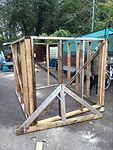DEP
DEVELOPMENT & EMERGENCY PRACTICE
Throughout my studies I have tended to focus on community-based projects - my interest for DEP as a specialisation in my Masters degree originated from my participation in the South Africa project in undergrad. I wanted to further understand the theory and impact behind development and emergency architecture to influence my future designs and share knowledge to others.
Modules I have completed with CENDEP as part of my Part 2 studies at Oxford Brookes University include:

SHELTER AFTER DISASTER
GROUP PROJECT: KEY CONSIDERATIONS FOR SHELTER PRACTITIONERS IN URBAN SHELTER RESPONSES
ESSAY: THE USE OF SCHOOL BUILDINGS AS EMERGENCY SHELTERS

CRITICAL ENQUIRY
ESSAY 1: ASSESSING THE IMPACT OF THE SUSTAINABLE LIVELIHOODS APPROACH TO TRANSFORM PEOPLES LIVES
ESSAY 2: FOREIGN AID

RESEARCH METHODS
ESSAY 1: ANALYSIS OF TRANSITIONAL PROJECTS AND POST-EARTHQUAKE RECOVERY IN CHRISTCHURCH, NEW ZEALAND
CASE STUDY: AMBAE TO MAEWO, ANALYSIS OF A SHELTER PROJECT FOLLOWING THE ERUPTION OF MANARO VOLCANO, VANUTAU

DISASTERS, VULNERABILITY AND CLIMATE CHANGE
GROUP PROJECT: VULNERABILITY AND RESILIENCE ANALYSIS IN INFORMAL SETTLEMENTS IN LUCKNOW, INDIA
KEY CONCEPTS
PARTICIPATION
Involve members of the community in a project - gather their ideas, utilise their skills and knowledge.


LOCALISATION
Ensure responses involve the local community, using local expertise and resources. All development must consider it's local context, no solution fixes all.
RESILIENCE
Strengthen a community's capacity to adapt and deal with challenging and changing conditions, whilst reducing their dependency on others, such as foreign aid.




